March 2021 national eResearch newsletter
Welcome to the March 2021 National eResearch Newsletter
AeRO is happy to announce that eResearch 2021 will be run as a hybrid conference (with online presentations and local events in major cities) from the 11th-15th October. Registration is now open at https://conference.eresearch.edu.au, where you can also register for sponsorship opportunities.
For those planning to attend or sponsor the conference, it may be worth checking if your organisation is able to claim under the new federal government “Business Events” grant scheme (https://www.austrade.gov.au/Australian/Tourism/Tourism-and-business/Grants/business-events-exhibitor-grants-program). If you are eligible, your organisation may be able to claim a grant to cover some of the costs if you book or sponsor before 30 June.
Looking beyond the eResearch conference, this has been a busy month for AeRO, and we hope to bring you updates on new activities shortly.
Phil Gurney, CEO
 |
Introduction to Gadi Training – Part 2: 18-Mar
NCI User Services will deliver part two of a new Introduction to Gadi online training course on Thursday 18 March. The course is intended for users who are getting started on Gadi, but is open to all NCI users.
Registration is required. See https://nci.org.au/news-events/events/introduction-gadi-part-2 for more details.
NCI will deliver this course monthly in 2021. An overview of Part One of the Introduction to Gadi course, including slides from the presentation is available at: https://opus.nci.org.au/display/Help/Introduction+to+Gadi+-+Part+1. |
 |
Significant National Data Collection Webinar: 18-Mar
NCI User Services will deliver part two of a new Introduction to Gadi online training course on Thursday 18 March. The course is intended for users who are getting started on Gadi, but is open to all NCI users.
Registration is required. See https://nci.org.au/news-events/events/introduction-gadi-part-2 for more details.
NCI will deliver this course monthly in 2021. An overview of Part One of the Introduction to Gadi course, including slides from the presentation is available at: https://opus.nci.org.au/display/Help/Introduction+to+Gadi+-+Part+1. |
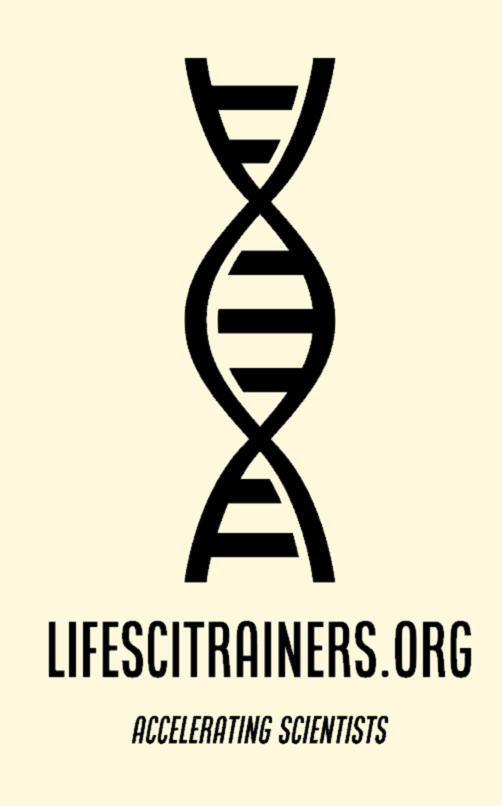 |
Global Survey for Life Science Training Instructors: 20-Mar
Workshops, bootcamps and short courses are important ways professionals in the life sciences update their skills. If you have instructed life scientists using these types of training, please participate in the first-ever global survey about this role.
The 20-minute survey by the LifeSciTrainers community is available in several languages and will be open until Saturday, 20 March 2021.
Read more: https://www.qcif.edu.au/news/global-survey-for-life-science-training-instructors/. |
 |
Meet Pawsey’s Quantum Pioneers: 26-Mar
Workshops, bootcamps and short courses are important ways professionals in the life sciences update their skills. If you have instructed life scientists using these types of training, please participate in the first-ever global survey about this role.
The 20-minute survey by the LifeSciTrainers community is available in several languages and will be open until Saturday, 20 March 2021.
Read more: https://www.qcif.edu.au/news/global-survey-for-life-science-training-instructors/. |
 |
AMA: Quantum Computing at Pawsey: 29-Mar
Join our upcoming Ask Me Anything (AMA) where you can talk to Pawsey expert staff and a community of online peers. 29 March: 10am AWST.
This fortnight’s AMA focuses on quantum computing at Pawsey. If you have any questions, please join us, especially if you are:
To register, click here: https://us02web.zoom.us/meeting/register/tZUkd-yrqT4qGdQ1OmlWPY9zCeg65F4lR-M4. |
 |
ARDC Nectar Research Cloud User Forum: 30-Mar
The ARDC Nectar Research Cloud User Forum is an online webinar held at 1pm (AEDT) Tuesday, 30 March 2021. The Forum will cover a number of themes including Nectar Cloud development, pre-emptible instances, advanced networking and user feedback.
Register now at: https://www.eventbrite.com.au/e/nectar-research-cloud-user-forum-tickets-142633433439. |
 |
Data Quality Virtual Meeting: 1-Apr
The Australian Data Quality Interest Group and the Information Quality Cluster of the Earth Science Information Partnership will have a joint virtual meeting on Thursday, 1st April, 12-1:30pm AEDT. The meeting will feature two presentations: Data quality reporting work at Integrated Marine Observing System (IMOS) by Dr Paul van Ruth, and Guidelines for FAIR data quality information by Dr Ge Peng (Earth System Science Center/NASA MSFC Impact, the University of Alabama in Huntsville); followed by half an hour discussion on the presentations or any topic that would be of interest to participants.
The meeting is open to anyone who is interested in the topic of data quality. Please contact contact Mingfang Wu (mingfang.wu@ardc.edu.au) or Catherine Brady (catherine.brady@ardc.edu.au) if you would like to know how to access the meeting. |
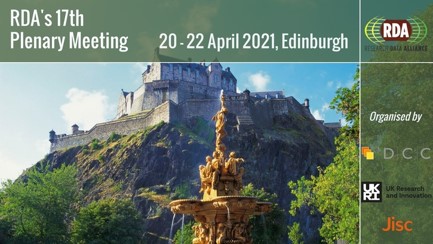 |
RDA Virtual Plenary 17: 20-22 April 2021, Edinburgh, Scotland: 20-Apr
The Australian Data Quality Interest Group and the Information Quality Cluster of the Earth Science Information Partnership will have a joint virtual meeting on Thursday, 1st April, 12-1:30pm AEDT. The meeting will feature two presentations: Data quality reporting work at Integrated Marine Observing System (IMOS) by Dr Paul van Ruth, and Guidelines for FAIR data quality information by Dr Ge Peng (Earth System Science Center/NASA MSFC Impact, the University of Alabama in Huntsville); followed by half an hour discussion on the presentations or any topic that would be of interest to participants.
The meeting is open to anyone who is interested in the topic of data quality. Please contact contact Mingfang Wu (mingfang.wu@ardc.edu.au) or Catherine Brady (catherine.brady@ardc.edu.au) if you would like to know how to access the meeting. |
 |
Enter a #DataScienceWeek Event: 10-May
Pawsey is excited to announce the return of Data Science Week 2021!
Data Science Week aims to bring together a community of data scientists across the Australasian region to network and discuss trending topics and ideas. This is achieved through your blog posts, training, events, conferences, workshops or any other idea you may have.
DSW2021 will run during the week of 10 – 14 May 2021 and we would love to share your contribution with the data science community.
Complete our Expression of Interest here: https://forms.gle/udTHRjWcGDfDb9SY8 |
 |
Pawsey Unveils its Super-Fast Tribute to the Quokka
The world’s friendliest animal will lend its name to Australia’s fastest new supercomputer, with the Pawsey Centre confirming its new system will be named Setonix – the scientific name for the quokka.
The HPE Cray EX supercomputer will be 30 times more powerful than Pawsey’s existing systems, Magnus and Galaxy, and will be used to help accelerate research projects such as the SKA.
The quokka is an iconic Western Australian animal that has helped promote WA to the world, just as the work at Pawsey helps raise the profile of WA and Australian researchers on the world stage.
Read more here: https://pawsey.org.au/pawsey-unveils-its-super-fast-tribute-to-the-quokka/. |
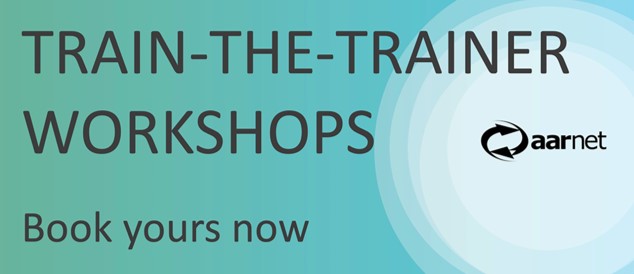 |
Bookings Open for the AARNet 2021 Train-The-Trainer Workshops
AARNet’s training is focused on improving the sector’s understanding of the capabilities of networks and data movement and how to use the services it provides, such as CloudStor and SWAN. Workshops provide the practical knowledge needed to transfer, store and manage research data (of any size) in complex scenarios throughout the research and data lifecycle.
See: https://news.aarnet.edu.au/aarnet-train-the-trainer-workshops/. |
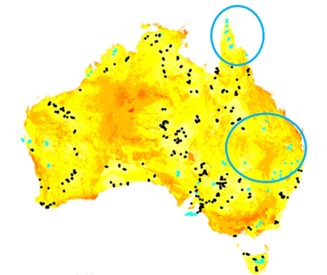 |
Gap-Filling an Ecosystem Monitoring Network
TERN has developed a powerful new method combining modelling and field surveys to determine the optimal location of new monitoring plots in bioregions not currently covered by the national research infrastructure. New TERN plots will provide better spatial and temporal data to meet the needs of researchers and modellers.
For more, see: https://www.tern.org.au/news-gap-filling/. |
 |
Earth Laid Bare
Enhanced data on soil and exposed rock for the entire Australian continent are now openly available, with visualisations coming soon. Using innovative techniques to ‘see-through’ vegetation and analyse the land’s surface like never before, the new Barest Earth data are set to enable improved soil, lithological, geochemical and environmental modelling at home and abroad. Products tailored specifically for state-scale analyses are also downloadable at multiple resolutions. For further details, see: https://www.tern.org.au/news-bareearthdata/. |
 |
NCI Research: Science Infrastructure Central to Award-Winning Art
For the second year in a row, NCI’s supercomputing and big data infrastructure plays a central role in the winning entry of the prestigious Waterhouse Natural Science Art Prize.
The winning artwork for 2020, Open Air, is a video project operatically showcasing the beauty and ever-changing nature of the landscapes around us, using satellite images of Australia stored and processed at NCI, and accessed with the help of Geoscience Australia.
Read more at: https://nci.org.au/research/research-highlights/science-infrastructure-central-award-winning-art. |
 |
NCI Research: Chronic Pain Relief from the Unlikeliest of Places
Sufferers of chronic pain, a nervous system disorder with few effective treatments, know the debilitating consequences of the illness. The treatments for chronic pain that we do have tend to be less directed than we would want: drugs that activate a wide range of receptors in the brain instead of just the few specific ones being targeted.
Dr Andrew Hung from RMIT University is conducting detailed molecular dynamics simulations on NCI’s Gadi supercomputer to learn about exactly how compounds found in the venom of marine cone snails interact with target receptors in the brain.
Read more at: https://nci.org.au/research/research-highlights/chronic-pain-relief-unlikeliest-places. |
 |
Support Sesh with the NCI User Support Team
Join NCI on the first Thursday of every month to chat with the User Support Team. Bring your questions – no problem too small, no task too tiny!
Meet the team and share your issues with us in a virtual face-to-face via Zoom.
Registration link is available here: https://nci.org.au/news-events/events/support-sesh-nci-user-support-team-0. |
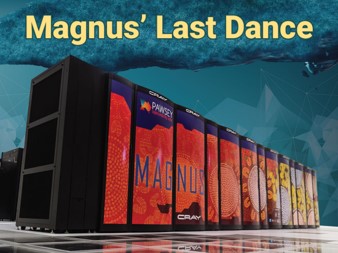 |
Magnus’ Last Dance
Pawsey’s Magnus petascale supercomputer is being retired at the end of this year. As one of Australia’s Tier-1 public access supercomputers, users have clocked over one billion core hours since its inception 6 years ago. Magnus has helped more than 100 projects each year.
This year is the last allocation year for Magnus before its users are switched to the whopping new 50-petabyte Hewlett-Packard Enterprise (HPE) computer.
Read some of the incredible science conducted on Magnus here: https://pawsey.org.au/magnus-last-dance/. |
 |
Capital Refresh Podcast Episode 9: Setonix
Join Pawsey’s Executive Director, Mark Stickells, and Stacy Tyson, the Centre’s Project Manager, as they discuss the announcement of Pawsey’s new supercomputing system – Setonix; also, highlights of 2020, and what we can expect in 2021. Listen to the podcast on:
Google Podcasts: http://bit.ly/2NYVV2a. |
 |
Computational Fluid Dynamics CoP
The Pawsey Supercomputing Centre have recently established a Computational Fluid Dynamics Community of Practice (CoP) where CFD practitioners at scale connect and discuss topics of interest, share best practices, and help answer each other questions about CFD and HPC.
To join the community of practice, click here: https://join.slack.com/t/cfdhpcaustraliacop/shared_invite/zt-ngnftqsh-G0zzX7iQM_7DMB16529eXQ. |
 |
USC Becomes a Full QCIF Member
USC has become a full QCIF Member, enabling its researchers greater access to QCIF’s resources and services.
The university, which has campuses from Brisbane to the Fraser Coast in Queensland, upgraded its longstanding connection to QCIF as an Associate Member to full membership as of 1 January 2021.
USC researchers (staff and RHD students) can now access QCIF’s cloud and high-performance compute services, bioinformatics consultancy, and digital skills training mostly for free, as well as other QCIF resources and services.
Read more: https://www.qcif.edu.au/news/usc-becomes-a-full-qcif-member/. |
 |
RCC Supports UQ Vaccination Advice Website
RCC has helped a University of Queensland academic to launch a website providing impartial and evidence-based information to dispel myths about vaccinations.
Dr Tom Aechtner, a Senior Lecturer in Religion and Science at UQ’s School of Historical and Philosophical Inquiry, is the brains behind the UQ Vaccination Choice website, which he hopes will enable people to make informed decisions and help improve vaccination rates across Australia.
Read more: https://rcc.uq.edu.au/article/2021/02/rcc-supports-uq-vaccination-advice-website. |
 |
JCU’s New QCIF eResearch Analyst
Dr Stefano Montanari has joined QCIF as an eResearch Analyst based at James Cook University in Townsville.
Stefano is an eResearch Specialist within JCU’s eResearch Centre. He has a background in marine biology and previously worked as an aquarist at JCU.
He will assist in the promotion and support of QCIF services to JCU researchers, including research computing and digital skills training.
Read more: https://www.qcif.edu.au/news/qcif-announces-new-jcu-eresearch-analyst/. |
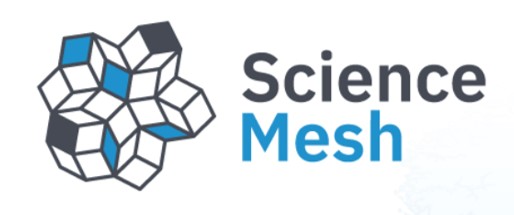 |
Next-Gen Petascale FAIR Data Repositories
Dr Stefano Montanari has joined QCIF as an eResearch Analyst based at James Cook University in Townsville.
Stefano is an eResearch Specialist within JCU’s eResearch Centre. He has a background in marine biology and previously worked as an aquarist at JCU.
He will assist in the promotion and support of QCIF services to JCU researchers, including research computing and digital skills training.
Read more: https://www.qcif.edu.au/news/qcif-announces-new-jcu-eresearch-analyst/. |
 |
eResearch Jobs
AeRO provides details of the latest eResearch job opportunities in the sector. Jobs are posted immediately to https://twitter.com/AeRO_eResearch, and the website at http://aero.edu.au/jobs/ and the eResearch Chat Platform at https://chat.aero.edu.au/c/jobs is also updated.
This is a free service for the whole eResearch community – to advertise a position, simply email loretta@aero.edu.au.
Here are some current vacancies:Service Engagement Manager (REANNZ), Imaging Administrative Officer, Imaging Engagement Officer, Senior Data Solutions Retention & Recoverability Specialist, Marketing and Communications specialist (AARNet). |
Contributions
This newsletter is based on contributions provided by members of the eResearch community, and draws on news articles and newsletters published across the sector. The Newsletter is published around the 16th of each month.
Please send any contributions (max. 100 words, plus a link and image) or pointers to any other relevant articles or newsletters to editor@aero.edu.au
Archives of these Newsletters are held at http://aero.edu.au/newsletters/.
Click HERE to add yourself to the eResearch Mailing List.
Thanks,
—AeRO Newsletter Editor

